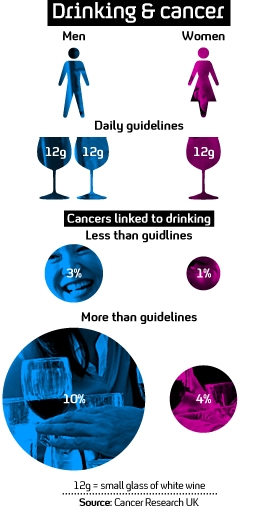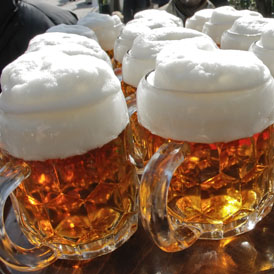Alcohol can cause cancer, even in ‘moderate’ amounts
The risk of developing cancer increases by drinking moderate amounts of alcohol according to latest analysis. But will this change our boozing behaviour, asks Tom Clarke.

While even small amounts increase the risk, drinking above recommended limits causes the majority of cancer cases linked to alcohol, experts said.
And even former drinkers who have now quit are still at risk of cancer, including of the oesophagus, breast, mouth and bowel.
NHS guidelines are that men should drink no more than three to four units a day while women should not go over two to three units a day.
But the new research, published in the British Medical Journal (BMJ), found cancer risks at even lower levels.
The research suggests that one in 10 cancers in men and one in 33 in women across western Europe are caused by drinking.
Experts analysed data from eight European countries, including the UK, and worked out what proportion of men and women were drinking above guidelines of 24g of alcohol a day for men and 12g a day for women.
In the UK, one unit is defined as 8g of alcohol, meaning 12g is roughly a small 125ml glass of white wine (1.6 units).
Cancers of the pharynx, oesophagus and voice box were most commonly caused by alcohol, followed by liver.
Alcohol blamed for 13,000 cases of cancer per year
The authors, from universities and hospitals across Europe, said: “Our data show that many cancer cases could have been avoided if alcohol consumption is limited to two alcoholic drinks per day in men and one alcoholic drink per day in women, which are the recommendations of many health organisations.
This research supports existing evidence that alcohol causes cancer and that the risk increases even with drinking moderate amounts. Naomi Allen, Oxford University
“And even more cancer cases would be prevented if people reduced their alcohol intake to below recommended guidelines or stopped drinking alcohol at all.”
Cancer Research UK, which helped fund the study, said the findings showed that alcohol causes at least 13,000 cases of cancer a year in the UK.
More than 6,000 of cancers of the mouth, oesophagus, voice box and pharynx are caused by drinking.
Alcohol also causes more than 3,000 bowel cancers and about 2,500 breast cancers per year, according to the charity.
But parts of the alcohol industry are calling for more research on the link between different drinks and cancer.
Moderate alcohol intake increases risk
The research is part of the European Prospective Investigation of Cancer (EPIC), one of the largest-ever studies into the links between diet and cancer.
Naomi Allen, from Oxford University, who works on the EPIC study, said: “This research supports existing evidence that alcohol causes cancer and that the risk increases even with drinking moderate amounts.
“The results from this study reflect the impact of people’s drinking habits about 10 years ago.
“People are drinking even more now than then and this could lead to more people developing cancer because of alcohol in the future.”
Neil Williams from the British Beer and Pub Association told Channel 4 News that the report “reminds us of the need for sensible drinking”.
He added: “We’d like to see the medical profession focus attention on the different effects of different types of alcohol so consumers can have as much information as possible.
“The link between alcohol and cancer isn’t caused by ethanol but by acetaldehyde (a chemical created when alcohol is broken down) which is lower in beer compared to some other drinks.”

But Naomi Allen told Channel 4 News that there was no research to back up that claim.
She said: “All the evidence we have suggests that it is total alcohol consumption which has an effect rather than differences between beer, wine or spirits.”
Sara Hiom, director of health information at Cancer Research UK, said: “Many people just don’t know that drinking alcohol can increase their cancer risk.
“In the last 10 years, mouth cancer has become much more common and one reason for this could be because of higher levels of drinking – as this study reflects.
“Along with being a non-smoker and keeping a healthy body weight, cutting back on alcohol is one of the most important ways of lowering your cancer risk.
“Keeping alcohol intake to a maximum of one small drink a day for women and two small drinks per day for men can have a real impact.”